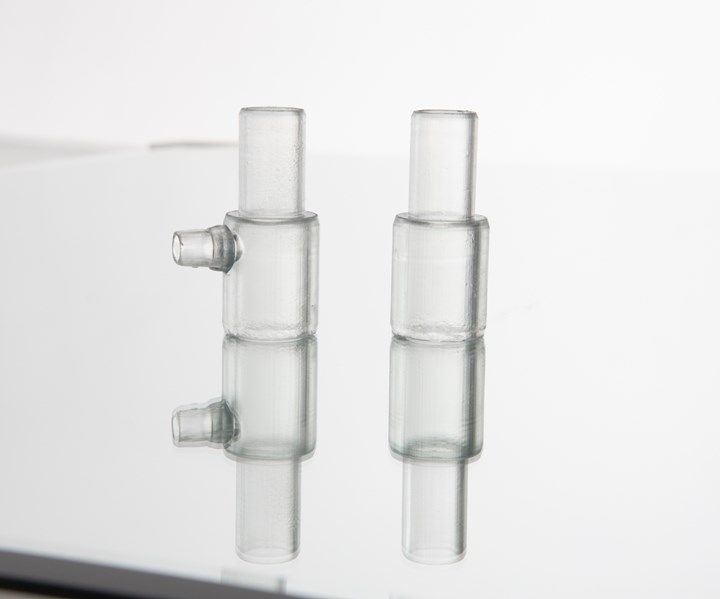Materials: New Medical-Grade Polypropylene-like Material For 3D Printing
xMED412 combines the physical properties and biocompatibility of medical-grade materials and is ideal for the production of various devices across industries.

xMED412 can be used in the fabrication or replacement of medical device connectors, where stiffness and dimensional stability is key.
Henkel and Nexa3D, the maker of stereolithography production 3D printers, have announced the immediate commercial availability of xMED412, a polypropylene-like material that is ideal for manufacturing a variety of biocompatible, medical and wearable devices. Manufactured by Henkel, xMED412 is entirely based on its Loctite MED412 material and is covered by all of its associated clearances, tests and certifications.
xMED412 was developed by Henkel to deliver highly consistent part performance with stand-out functionality. The medical-grade material is reportedly a very strong and durable photopolymer with mechanical attributes similar to polypropylene with “fantastic” elongation, impact strength, and compression strength.
Henkel says that the company developed and tested the material with Nexa3D’s NXE400 3D printer. xMED412 parts printed on Nexa3D’s NXE400 require post processing and cleaning in accordance with the company’s recommendations and can be machined, tapped, or polished to deliver desired production finishes.
There are many reasons why additive plastics like xMED412 are increasingly in high demand, the companies said. xMED412 is a lightweight yet sturdy material that comes with inherent insulating properties, designed to withstand impact, moisture and vibration. These highly desirable features and attributes are said to be ideal for devices that might need to be sterilized or disinfected and are shipped around the world for use in homecare and healthcare settings.
In regards to the current COVID-19 pandemic, the companies said that nasopharyngeal swabs manufactured with xMED412 on the NXE400, in accordance with its published procedures, have already been cleared through clinical trials and are in compliance with ISO 10993 testing and FDA Class I Exempt classification. Nexa3D says they quickly qualified and scaled up single printer production capacity to 5400 swabs a day at its Nexa3D flexible factory in support of the ongoing demand for nasal swabs.
xMED412 is also ideal for the production of orthotics guides and braces, respirators, personalized audio products, and diving and athletic mouth gear.
Both the NXE400 and xMED412 are immediately available for purchase through Nexa3D’s growing network of resellers.
Related Content
-
Additive Technologies for Injection Mold Tooling Ride Tailwinds
NPE2024: Lowering barriers to additive manufacturing adoption in toolmaking.
-
Medical Manufacturer Innovates with Additive Manufacturing and Extrusion Technology Hubs
Spectrum Plastics Group offers customers two technology hubs — one for extrusion, the other for additive manufacturing — to help bring ground-breaking products to market faster.
-
Freeform Injection Molding Eases the Path to Medical Device Product Testing
A development and manufacturing service provider is using dissolvable molds to build injection molded silicone prototypes.
















